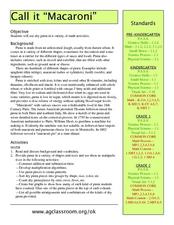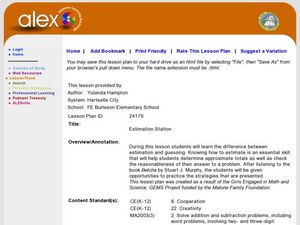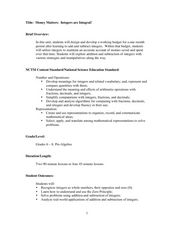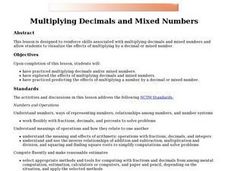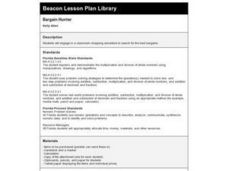Curated OER
Call it "Macaroni"
Who knew there were so many fun educational opportunities featuring pasta? Scholars read a brief informational text about the history of pasta (note that "macaroni" is spelled two different ways, so address this if kids are reading...
Curated OER
Stochastic and Deterministic Modeling
Explore the difference between stochastic and deterministic modeling through programming. First have the class write algorithms for relatively simple tasks using pseudocode. Use the Python 2.7 program app to simulate Mendel's Pea Pod...
Alabama Learning Exchange
Estimation Station: Why Estimating is Better than Guessing
Youngsters discover the difference between estimating and guessing. They estimate how many items are contained in a jar as they read a story. After the story, pupils discover the differences between estimating and guessing and create a...
Curated OER
Roman Bernardo: Solving Linear Equations
Mathematicians use an inquiry method to solve linear equations. In this linear equations activity, students practice solving equations using addition, subtraction, multiplication and division. They solve multi-step equations and...
Curated OER
Matrices: A Secret Weapon
Students perform operations with matrices. In this algebra lesson, students use cryptography and cryptanalysis to solve problems. They add, subtract, and multiply matrices.
National Security Agency
Money Maters: Integers are Integral!
A thoroughly-written lesson plan and a plethora of worksheets about integers comprise this resource. Neophyte number crunchers learn to recognize integers, add and subtract them, and apply the concepts to the designing of a personal...
EngageNY
Dividing by (x – a) and (x + a)
Patterns in math emerge from seemingly random places. Learners explore the patterns for factoring the sum and differences of perfect roots. Analyzing these patterns helps young mathematicians develop the polynomial identities.
Education Development Center
Adding Fractions with Unlike Denominators
If the fractions don't have a common denominator, make them have one. Learners first read and analyze a conversation of pupils trying to add 2/5 and 1/2. They compare the process of adding fractions to the process of adding quantities...
Curated OER
Multiplying Exponents vs. Powers of Powers
Use the power of a power property to solve exponential functions. The lesson refers to differentiating between multiplying or adding exponents to find the value, and how to find the product of a power of a power.
Curated OER
Numerical Determination of Drag Coefficients
Young scholars create a video of an object falling with a drag. For this physics lesson, students calculate drag coefficient using data from Logger Pro. They calculate velocity and acceleration of the object.
Curated OER
Multiplying Decimals and Mixed Numbers
Young scholars multiply decimals and/or mixed numbers. They explore the effects of multiplying decimals and mixed numbers. They practice estimating answers when a number is multiplied by a decimal or mixed number.
Curated OER
Bell Curve
Students explore averages by completing a data analysis activity. In this bell curve lesson, students measure different food items and plot their measurements on a X and Y axis. Students create bell curves around the average weight or...
Curated OER
Bargain Hunter
Students engage in a classroom shopping adventure to search for the best bargains.
